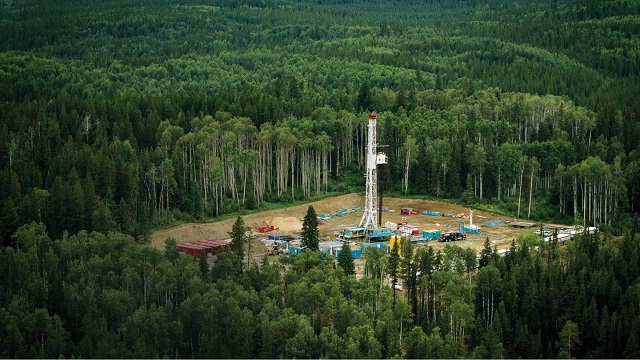Alberta
The Full Montney: Massive Montney Play Ramping up With Canadian LNG Exports on the Horizon

Photo courtesy Tourmaline
From the Canadian Energy Centre
‘LNG is in greater demand than ever before and continues to drive economic growth and enhance energy security across the world’
The massive Montney natural gas play in Alberta and B.C. is growing in importance as world liquefied natural gas (LNG) demand surges and Canada nears completion of its first LNG export project.
The Montney – which rivals the Marcellus, the largest natural gas play in the U.S., for available resources – has seen more than $16 billion worth of ownership deals in the last two years, according to Evaluate Energy.
But the play is still in its early innings, say analysts with RBC Capital Markets.
That’s good news for LNG, where the world needs more supply over the long term.
“LNG is in greater demand than ever before and continues to drive economic growth and enhance energy security across the world,” said Joseph McMonigle, secretary general of the International Energy Forum (IEF).
Based in Riyadh, Saudi Arabia, the IEF represents energy ministers from 72 producing and consuming nations including Canada, the United States, China, India, Germany and the United Kingdom.
After reaching a record 390 million tonnes in 2022, world LNG demand is expected to grow by another 25 percent to 500 million tonnes annually in five years, according to a new IEF report.
While Canada currently ships a small amount of LNG overseas by shipping container, it has yet to export any large quantities by LNG ocean carriers. This will change with the completion of the $18 billion first phase of the LNG Canada project, expected by 2025.
The recently completed Coastal GasLink pipeline will carry natural gas from the Montney play to the terminal.
Coastal GasLink will result in a step change in how natural gas is produced, shipped and priced in western Canada, RBC said.
Its initial capacity of 2.1 billion cubic feet per day can be increased to 5 billion cubic feet per day with additional compression facilities along the route. And through the less-than-a-kilometer long Cedar Link connector, Coastal GasLink would feed the proposed Cedar LNG project, led by the Haisla Nation.
Montney gas will also supply the Woodfibre LNG project and is planned to feed the proposed Ksi Lisims LNG project, led by the Nisga’a Nation.
The Montney now provides roughly half of Canada’s existing natural gas production, or about 10 billion cubic feet per day, RBC said.
Analysts predict that by 2030, roughly two thirds of all natural gas wells in western Canada will target the Montney play, producing about 18 billion cubic feet per day by the end of this decade.
Alberta
Red Deer Justice Centre Grand Opening: Building access to justice for Albertans

The new Red Deer Justice Centre will help Albertans resolve their legal matters faster.
Albertans deserve to have access to a fair, accessible and transparent justice system. Modernizing Alberta’s courthouse infrastructure will help make sure Alberta’s justice system runs efficiently and meets the needs of the province’s growing population.
Alberta’s government has invested $191 million to build the new Red Deer Justice Centre, increasing the number of courtrooms from eight to 12, allowing more cases to be heard at one time.
“Modern, accessible courthouses and streamlined services not only strengthen our justice
system – they build safer, stronger communities across the province. Investing in the new Red Deer Justice Centre is vital to helping our justice system operate more efficiently, and will give people in Red Deer and across central Alberta better access to justice.”

Government of Alberta and Judiciary representatives with special guests at the Red Deer Justice Centre plaque unveiling event April 22, 2025.
On March 3, all court services in Red Deer began operating out of the new justice centre. The new justice centre has 12 courtrooms fully built and equipped with video-conference equipment to allow witnesses to attend remotely if they cannot travel, and vulnerable witnesses to testify from outside the courtroom.
The new justice centre also has spaces for people taking alternative approaches to the traditional courtroom trial process, with the three new suites for judicial dispute resolution services, a specific suite for other dispute resolution services, such as family mediation and civil mediation, and a new Indigenous courtroom with dedicated venting for smudging purposes.
“We are very excited about this new courthouse for central Alberta. Investing in the places where people seek justice shows respect for the rights of all Albertans. The Red Deer Justice Centre fills a significant infrastructure need for this rapidly growing part of the province. It is also an important symbol of the rule of law, meaning that none of us are above the law, and there is an independent judiciary to decide disputes. This is essential for a healthy functioning democracy.”
“Public safety and access to justice go hand in hand. With this investment in the new Red Deer Justice Centre, Alberta’s government is ensuring that communities are safer, legal matters are resolved more efficiently and all Albertans get the support they need.”
“This state-of-the-art facility will serve the people of Red Deer and surrounding communities for generations. Our team at Infrastructure is incredibly proud of the work done to plan, design and build this project. I want to thank everyone, at all levels, who helped make this project a reality.”
Budget 2025 is meeting the challenge faced by Alberta with continued investments in education and health, lower taxes for families and a focus on the economy.

Quick facts
- The new Red Deer Justice Centre is 312,000 sq ft (29,000 m2). (The old courthouse is 98,780 sq ft (9,177 m2)).
- The approved project funding for the Red Deer Justice Centre is about $191 million.
Alberta
CPP another example of Albertans’ outsized contribution to Canada

From the Fraser Institute
By Tegan Hill
Amid the economic uncertainty fuelled by Trump’s trade war, its perhaps more important than ever to understand Alberta’s crucial role in the federation and its outsized contribution to programs such as the Canada Pension Plan (CPP).
From 1981 to 2022, Albertan’s net contribution to the CPP—meaning the amount Albertans paid into the program over and above what retirees in Alberta received in CPP payments—was $53.6 billion. In 2022 (the latest year of available data), Albertans’ net contribution to the CPP was $3.0 billion.
During that same period (1981 to 2022), British Columbia was the only other province where residents paid more into the CPP than retirees received in benefits—and Alberta’s contribution was six times greater than B.C.’s contribution. Put differently, residents in seven out of the nine provinces that participate in the CPP (Quebec has its own plan) receive more back in benefits than they contribute to the program.
Albertans pay an outsized contribution to federal and national programs, including the CPP because of the province’s relatively high rates of employment, higher average incomes and younger population (i.e. more workers pay into the CPP and less retirees take from it).
Put simply, Albertan workers have been helping fund the retirement of Canadians from coast to coast for decades, and without Alberta, the CPP would look much different.
How different?
If Alberta withdrew from the CPP and established its own standalone provincial pension plan, Alberta workers would receive the same retirement benefits but at a lower cost (i.e. lower CPP contribution rate deducted from our paycheques) than other Canadians, while the contribution rate—essentially the CPP tax rate—to fund the program would likely need to increase for the rest of the country to maintain the same benefits.
And given current demographic projections, immigration patterns and Alberta’s long history of leading the provinces in economic growth, Albertan workers will likely continue to pay more into the CPP than Albertan retirees get back from it.
Therefore, considering Alberta’s crucial role in national programs, the next federal government—whoever that may be—should undo and prevent policies that negatively impact the province and Albertans ability to contribute to Canada. Think of Bill C-69 (which imposes complex, uncertain and onerous review requirements on major energy projects), Bill C-48 (which bans large oil tankers off B.C.’s northern coast and limits access to Asian markets), an arbitrary cap on oil and gas emissions, numerous other “net-zero” targets, and so on.
Canada faces serious economic challenges, including a trade war with the United States. In times like this, it’s important to remember Alberta’s crucial role in the federation and the outsized contributions of Alberta workers to the wellbeing of Canadians across the country.
-

 2025 Federal Election2 days ago
2025 Federal Election2 days agoBREAKING: THE FEDERAL BRIEF THAT SHOULD SINK CARNEY
-

 2025 Federal Election2 days ago
2025 Federal Election2 days agoCHINESE ELECTION THREAT WARNING: Conservative Candidate Joe Tay Paused Public Campaign
-

 2025 Federal Election1 day ago
2025 Federal Election1 day agoMark Carney Wants You to Forget He Clearly Opposes the Development and Export of Canada’s Natural Resources
-

 International1 day ago
International1 day agoPope Francis’ body on display at the Vatican until Friday
-

 Business2 days ago
Business2 days agoHudson’s Bay Bid Raises Red Flags Over Foreign Influence
-

 2025 Federal Election1 day ago
2025 Federal Election1 day agoCanada’s pipeline builders ready to get to work
-

 2025 Federal Election16 hours ago
2025 Federal Election16 hours agoFormer WEF insider accuses Mark Carney of using fear tactics to usher globalism into Canada
-

 International2 days ago
International2 days agoPope Francis’ funeral to take place Saturday

